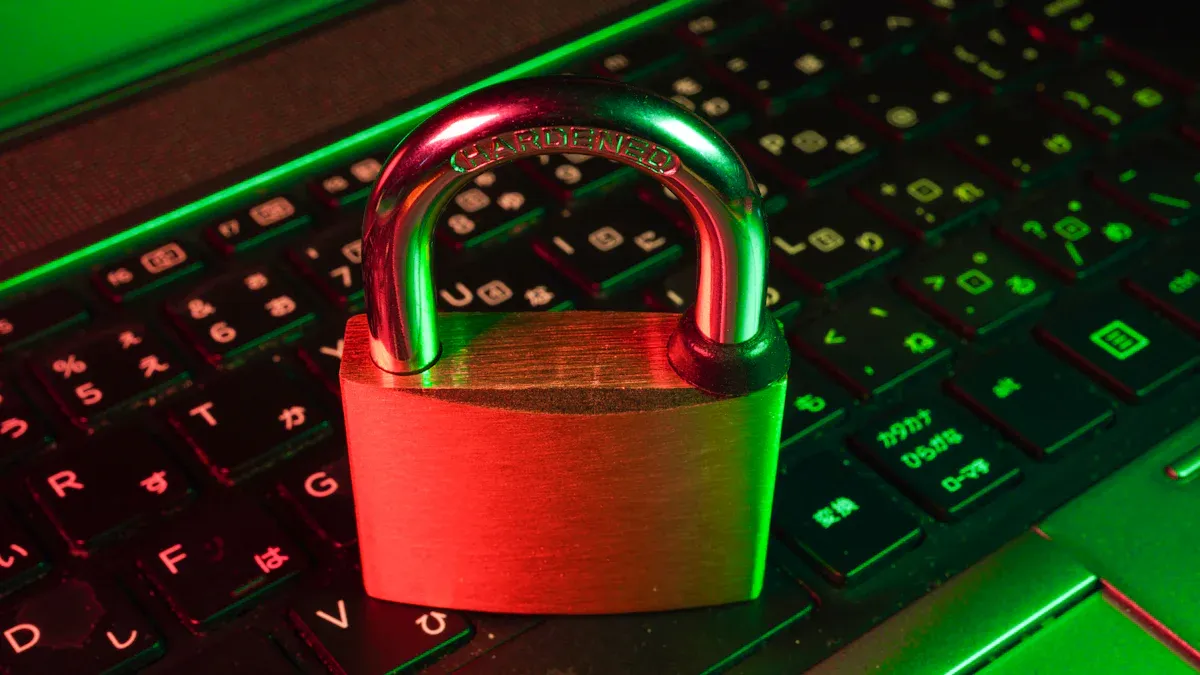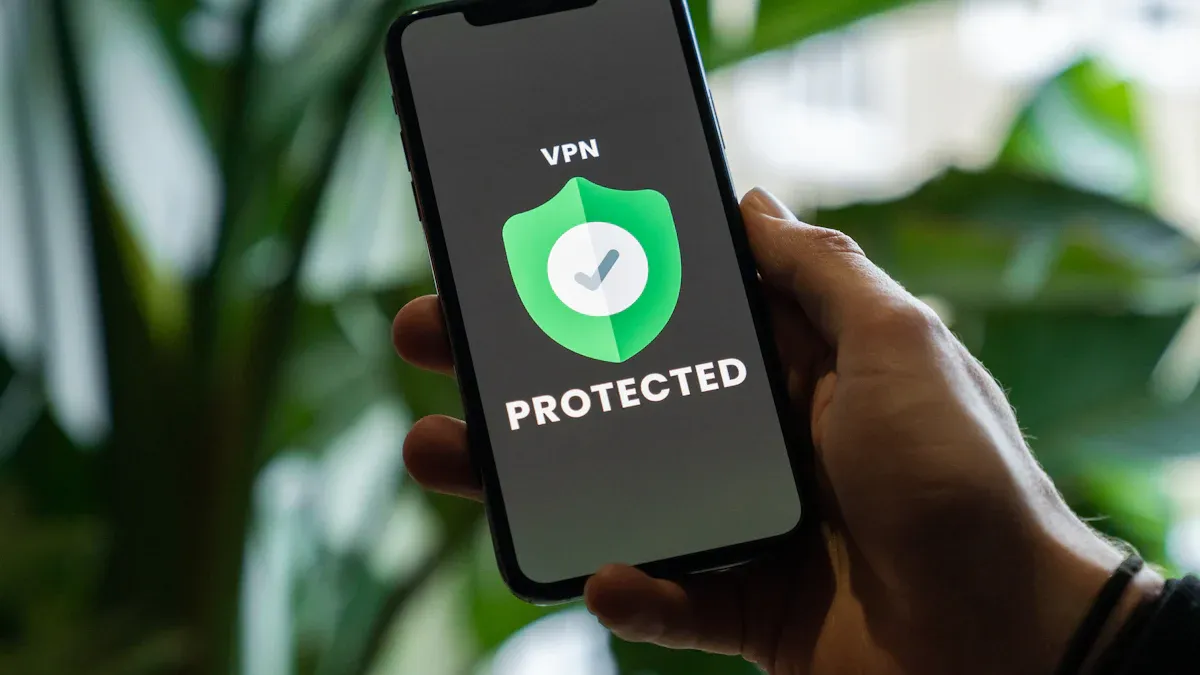- EasyCard
- Trade
- Help
- Announcement
- Academy
- SWIFT Code
- Iban Number
- Referral
- Customer Service
- Blog
- Creator
Is Your Data Safe with Alipay How the Platform Guards Your Information

Image Source: unsplash
Is Alipay safe? Yes, you can trust Alipay to protect your personal information, but you should stay aware of possible risks. Alipay uses strong security measures to help keep your data safe. Many users worry about how Alipay handles sensitive data, such as health records and payment details. Some people also express concern about data sharing with other companies or government agencies. Alipay continues to improve its security to address these concerns. When you use this mobile payment app for online payments, you may wonder, how does Alipay work to protect you? Alipay safety depends on how well these security systems function and how you use the app. If you ask, how does Alipay work for users outside China, you will find that similar security measures apply. How does Alipay work with partners and fintech companies in other countries? The app follows privacy rules, but issues like weak encryption in past data transfers have raised questions.
Key Takeaways
- Alipay protects your data with strong encryption, biometric checks, and real-time risk monitoring to keep your payments safe.
- The app uses two-factor authentication and separate passwords for login and payment to add extra security layers.
- Alipay follows strict privacy rules and keeps your personal data only as long as needed, deleting it when no longer required.
- You can help protect your account by using strong passwords, enabling two-factor authentication, and avoiding suspicious links or QR codes.
- Despite a past data leak, Alipay maintains a strong security record and keeps improving its safety features to protect users worldwide.
Alipay Safety Features

Image Source: unsplash
Alipay safety stands on a strong foundation of advanced encryption, biometric verification, and real-time risk monitoring. These security measures protect your information and make online payments safer for you. If you wonder how does Alipay work to keep your data secure, you will find that the platform uses several layers of protection.
Encryption Technology
Alipay uses advanced encryption to protect your data both when it moves across the internet and when it sits on servers. For data in transit, Alipay uses SSL and TLS protocols. These protocols scramble your information so that hackers cannot read it during transmission. For data at rest, Alipay applies the Advanced Encryption Standard (AES), which is trusted worldwide.
- AES-256 encryption uses a 256-bit key. This creates 2^256 possible combinations, making brute-force attacks nearly impossible.
- The algorithm works quickly, so you do not notice any delay during online payments.
- AES-256 is trusted by experts and resists current and future attacks.
- This encryption keeps your financial transactions confidential and prevents tampering.
Alipay also uses hardware-based confidential computing. With Intel Xeon processors and Intel TDX, your data stays protected even while it is being processed. These technologies create secure virtual machines that keep your information isolated from threats.
You must use separate passwords for login and payment. This adds another layer of security. Alipay safety also includes two-factor authentication, which means you need more than just a password to access your account.
Note: Alipay has earned many industry-standard security certifications. These include PCI 3DS, ISO 27001, SOC 1, SOC 2, and HIPAA. These certifications show that Alipay meets strict global standards for protecting your data.
| Certification Category | Examples of Industry-Standard Security Compliance Certifications Obtained |
|---|---|
| Global Certifications | PCI 3DS, ISO 27001, ISO 27017, ISO 27018, ISO 27701, ISO 29151, ISO 27799, ISO 27040, BS 10012, SOC 1, SOC 2, SOC 3, CSA STAR |
| Regional Certifications | MTCS (Singapore), DPTM (Singapore), C5 (Germany), AIC4 (Germany), Trusted Cloud (Germany), NESA/ISR (UAE), NIST (US), MLPS 2.0 (China), ITSS (China), NISC (Japan), TRUCS (China), CTM (Singapore), K-ISMS (Korea) |
| Industry Certifications | HIPAA (US), TISAX (Germany), GxP (US), MPA (US), SEC Rule-17a (US), OSPAR (Singapore), FERPA & HECVAT (US), COPPA (US), DPP Broadcast & Production (UK), FISC (Japan) |
Biometric Verification
Biometric verification gives you a secure and easy way to access your Alipay account. You can use fingerprint recognition, facial recognition, or even palm print technology. These methods make it hard for anyone else to log in or make payments without your permission.
- Alipay supports fingerprint and facial recognition for both login and transaction approval.
- You can enable these features in the Alipay Wallet app.
- Alipay works with technology partners like Megvii for facial recognition and Huawei for fingerprint sensors.
- Facial recognition uses your smartphone camera and reaches high accuracy.
- Alipay has introduced palm print payment in China, showing a move toward more advanced biometric verification.
Biometric verification adds another layer to Alipay safety. It helps answer the question, how does Alipay work to stop fraud? Only you can use your unique features to access your account, making it much harder for criminals to break in.
Risk Monitoring
Alipay uses real-time risk monitoring to watch for suspicious activity every second. The AlphaRisk system checks transactions and account behavior for signs of fraud. If AlphaRisk finds something unusual, it can alert you right away or freeze the transaction.
- AlphaRisk identifies suspicious accounts and transaction histories.
- The system can delay payments for 2 or 24 hours, giving you time to react if something seems wrong.
- AI-powered risk engines analyze transactions 24/7, looking for fraud patterns.
- The system uses over 200 algorithms and updates daily to catch new threats.
- You receive real-time alerts if Alipay spots suspicious activity.
- You can dispute charges and freeze your account if needed.
- Alipay’s fraud prevention team works around the clock to keep your money safe.
Alipay safety depends on these advanced tools. If you ask, how does Alipay work to protect users, you will see that risk monitoring is a key part of the answer. These systems help keep the money loss rate below the industry average.
Tip: Alipay also educates you on how to spot scams and avoid risky behavior. This helps you stay safe while using the app for online payments.
How Alipay Protects Personal Data

Image Source: unsplash
Alipay takes your privacy seriously. The platform uses strict rules and advanced technology to keep your information safe. You may wonder how Alipay protects personal data, especially when you use the app for payments or store sensitive details. Let’s look at the main ways Alipay manages your data.
Data Retention
Alipay only keeps your transaction data for as long as needed. The platform follows clear rules about how long to store your information. Here are the main points:
- Alipay keeps your data only as long as it needs to provide payment services and meet legal requirements.
- The length of time depends on several factors:
- Laws and regulations that apply to the service
- The chance of legal claims against the service
- The need to support merchants and partners
- The type of personal data involved
- The legal reason for collecting your data
You can see the details in the table below:
| Aspect | Details |
|---|---|
| Retention Duration | At least five (5) years after the relevant transaction |
| Extension Condition | Longer if required by applicable law |
| Data Type | Transaction data and related documents |
| Source | Checkout.com legal document |
Alipay deletes or anonymizes your data when it is no longer needed. This helps reduce risks and keeps your information private.
Access Controls
Alipay uses strong access controls to make sure only the right people can see your sensitive information. You have several layers of protection when you use the app:
- Two-factor authentication (2FA) checks your identity before you make payments.
- Each payment needs a PIN or a biometric scan, such as your fingerprint or face.
- Alipay encrypts your data both when it moves across the internet and when it sits on servers.
- The platform uses SSL encryption to keep your information safe during transmission.
- Dynamic QR codes change often, so no one can reuse them or scan them without your permission.
- Real-time risk management watches for strange activity and stops threats quickly.
- Alipay’s security teams work day and night to keep your account safe.
You can trust that Alipay limits access to your data. Only authorized staff can see sensitive details, and the company invests in special teams and technology to protect your account.
Note: Alipay’s account monitoring and transaction confirmation steps help stop fraud before it happens. You get alerts if anything unusual occurs.
Privacy Policies
Alipay’s privacy policies set clear rules for how your data is handled. The company follows strict laws in China and other countries. Here are the key parts of these policies:
- Alipay stores your personal information in China. If it sends data to other countries, it follows all laws and keeps your information confidential.
- The platform only keeps your data as long as needed for services or as required by law. After that, it erases or anonymizes your information.
- Alipay uses a mix of security technology and management systems to stop unauthorized access, changes, or leaks.
- A special department inside Alipay looks after personal information security.
- The company has emergency plans to handle any problems with your data.
Alipay must also follow important laws, such as the Personal Information Protection Law (PIPL), the Data Security Law, and the Cybersecurity Law in China. These laws require Alipay to classify data, get your consent, and use strong encryption. For users outside China, Alipay works with local partners and follows rules like the General Data Protection Regulation (GDPR) in Europe. This helps protect your rights and keeps your data safe, no matter where you use the app.
Tip: Alipay’s focus on privacy and security helps build trust with users around the world. The company updates its policies and systems to meet new laws and protect your information.
User Safety Tips
Strong Passwords
You play a big role in keeping your Alipay account safe. Always create a strong password that others cannot guess. Use a mix of letters, numbers, and symbols. Do not use your birthday or simple words. Change your password often. Never share your password with anyone. If you use the same password for other accounts, change it right away. Alipay lets you set different passwords for login and payment. This makes it harder for someone to break into your account. You should also turn on two-factor authentication. This adds another step when you log in or pay, making your account even safer.
Tip: Write your password down and keep it in a safe place, not on your phone or computer.
Avoiding Scams
You need to stay alert to avoid Alipay scam attempts. Scammers often try to trick you with fake QR codes. These scams can steal your money if you are not careful. Here are some ways to avoid Alipay scam risks:
- Make sure no one scans your payment code without your permission.
- Always check the collect code with the person you want to pay before you send money.
- Look at public QR codes closely. If you see signs of tampering or replacement, do not use them.
Scammers may also send fake messages or links. Never click on links from unknown sources. If someone asks for your Alipay details, do not share them. You can avoid Alipay scam losses by staying cautious and checking every payment step.
Reporting Issues
If you notice something strange in your Alipay account, act fast. Open the app and go to the help center. You can report problems like lost money, fake messages, or account changes. Alipay has a team that works to solve these issues quickly. You should also contact your bank, such as a Hong Kong bank, if you see any unknown charges. Keep records of your payments and messages. This helps Alipay find and fix the problem. When you report issues right away, you help avoid Alipay scam losses and keep your account safe.
Note: Alipay updates its safety tips often. Check the app for new advice to protect your information.
Is Alipay Safe?
Security Record
You may ask, is alipay safe after hearing about news stories or rumors. Alipay has built a strong reputation for security over many years. Most users trust the platform for daily payments and transfers. However, you should know about a major event in June 2025. During this time, a massive data leak exposed over 300 million alipay user records. The leaked information included payment card numbers, names, phone numbers, and even behavioral profiles. Cybersecurity researchers found a 631GB database online that contained these records. The database was quickly taken offline, but the source remains unknown. This breach was part of a larger leak that affected other platforms, such as WeChat and several banks.
Despite this incident, alipay safety remains high. No other major breaches have targeted alipay alone. When you compare alipay to other digital payment platforms, you see that its security incident rate is low. For example, mobile payment fraud in China is very small compared to the huge transaction volume. PayPal’s fraud rate is 0.32%, which is already low, and alipay’s rate is likely even lower. Alipay and WeChat Pay also offer buyer protection without high fees, making them secure and user-friendly. You can feel confident using alipay for your payments.
Ongoing Improvements
Is alipay safe today? You should look at how alipay keeps improving its security. In 2024, alipay launched “Alipay Tap!” This new feature lets you pay by tapping your phone, but you must unlock your device and confirm each transaction. This step adds extra protection against unauthorized payments. Alipay also continues to improve biometric authentication, such as fingerprint and facial recognition. These tools help keep your account safe from fraud.
Alipay safety depends on constant updates. The platform uses strong encryption and risk monitoring to protect your information. You benefit from these upgrades every time you use the app. Alipay listens to user concerns and works to fix any weak points. If you wonder, is alipay safe for the future, you can see that the company invests in new technology and security features. You play a role too—by following safety tips, you help keep your account secure.
You can trust alipay to protect your information with strong security features. The platform uses two-factor authentication, digital certificates, and a separate payment password to keep your account safe. Alipay also offers a member protection program if you face unauthorized transactions. To stay even safer, you should enable two-factor authentication, use strong passwords, and check merchant QR codes before paying. Many users ask if alipay is safe. The answer is yes, thanks to advanced encryption, risk monitoring, and strict data protection rules.
FAQ
How do you reset your Alipay password if you forget it?
You can tap “Forgot Password” on the login screen. Follow the steps to verify your identity with your phone number or email. Set a new password. Make sure you choose a strong password that you have not used before.
Can you use Alipay safely outside China?
Yes, you can use Alipay in many countries. The app uses the same security features everywhere. You should always check for updates and follow local rules. Alipay partners with trusted banks, including Hong Kong banks, to protect your payments.
What should you do if you see a suspicious transaction?
Report the transaction in the Alipay app right away. Go to the help center and follow the steps to freeze your account if needed. Contact your bank, such as a Hong Kong bank, to block your card and prevent further losses.
Tip: Keep records of all your payments and messages. This helps Alipay solve problems faster.
Does Alipay share your personal data with other companies?
Alipay does not share your personal data with other companies without your consent. The platform follows strict privacy laws in China and other countries. You can review the privacy policy in the app to see how your information is used and protected.
When managing payments and data with Alipay, cross-border payment needs may require additional security measures. BiyaPay offers an efficient alternative with real-time exchange rate queries and conversions, supporting over 30 fiat currencies and 200+ digital currencies, remittance fees as low as 0.5%, and coverage across over 200 countries and regions with same-day remittance delivery. Its quick registration, no-overseas-account-needed US/HK stock investment features, and the launched Easy Card service (enabling easy global payments) enhance your financial security. Experience these benefits now to optimize your payment safety! Whether using Alipay or other platforms, BiyaPay helps protect your data and simplify cross-border transactions.
*This article is provided for general information purposes and does not constitute legal, tax or other professional advice from BiyaPay or its subsidiaries and its affiliates, and it is not intended as a substitute for obtaining advice from a financial advisor or any other professional.
We make no representations, warranties or warranties, express or implied, as to the accuracy, completeness or timeliness of the contents of this publication.




Contact Us
Company and Team
BiyaPay Products
Customer Services
is a broker-dealer registered with the U.S. Securities and Exchange Commission (SEC) (No.: 802-127417), member of the Financial Industry Regulatory Authority (FINRA) (CRD: 325027), member of the Securities Investor Protection Corporation (SIPC), and regulated by FINRA and SEC.
registered with the US Financial Crimes Enforcement Network (FinCEN), as a Money Services Business (MSB), registration number: 31000218637349, and regulated by FinCEN.
registered as Financial Service Provider (FSP number: FSP1007221) in New Zealand, and is a member of the Financial Dispute Resolution Scheme, a New Zealand independent dispute resolution service provider.



















